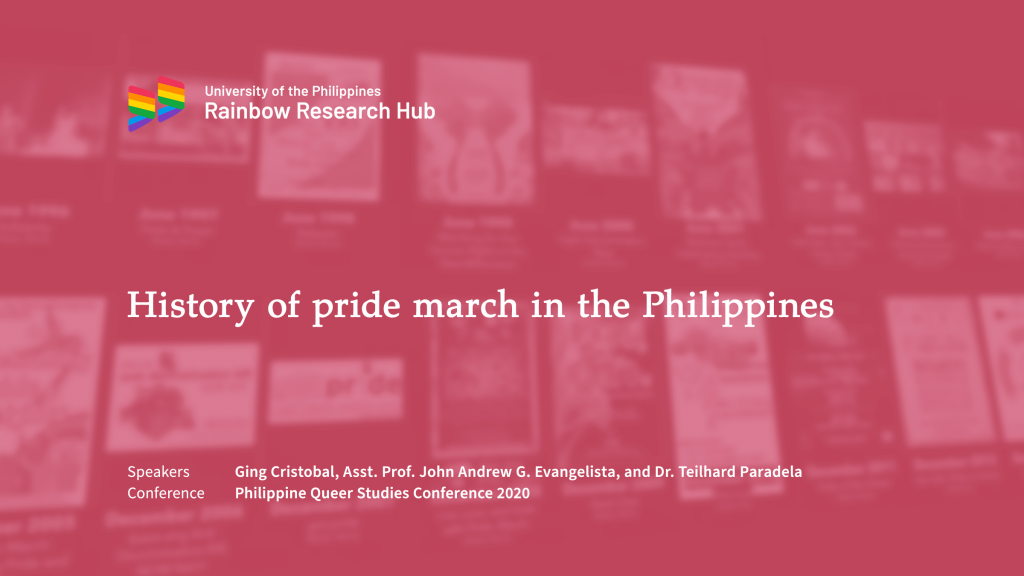
Essence
The first special session of the Philippine Queer Studies Conference traces the origins of the LGBTQI movement and Pride March in the Philippines.
Speakers: Ging Cristobal, John Andrew G. Evangelista, and Teilhard Paradela
Organizations: UP Babaylan and UP Center for Women’s and Gender Studies
Explore
Express
Does your city/municipality hold a Pride march? If yes, do research about it. If no, look for the nearest city/municipality that organizes a Pride march and do research about it. Then, create a mind map or a timeline of Pride marches in your city/municipality that answers the following questions:
- When was the first Pride march in your city/municipality held? Who were its organizers?
- Were there other LGBTQI-related milestones that happened in your city/municipality that are related to these Pride marches? For example, the formation of Lagablab LGBT Network and Task Force Pride (now Metro Manila Pride) can be traced directly to the 1996 Pride March.
Engage
History is written by the victors, so they say, and documenting and historicizing future historical events proves to be an ongoing challenge for LGBTQI activists not only in the United States, but also in the Philippines—after all, 1994 and 1996 was only one generation ago. That said:
- Why should we acknowledge the “multiple firsts of Pride” and take a diverse, inclusive, and therefore critical approach to history? Which narratives get excluded if we do not do so? Why is it important to recognize these narratives?
- The lecture is limited to the first Pride marches in Metro Manila and unfortunately does not acknowledge Pride marches outside of the country’s capital. In creating the mind map or timeline of Pride marches in your city/municipality, did you experience a similar challenge in historicizing?
- Pride is only one part of the spectrum of LGBTQI activism. Should we move beyond the historicizing and mythologizing of Pride? What questions should we be asking and answering in our pursuit of a queer collective history?
Expand
On the first Pride marches: Speaker Teilhard Paradela summarizes the short history of Pride in the Philippines and how the 1996 Pride March catalyzed the LGBTQI movement as we know it today. They also argue that LGBTQI communities should recognize the “multiple firsts of Pride” in this article. The unabridged version goes into further detail here (link to download; English).
On The Lesbian Collective (TLC) and the 1993 International Women’s Day (IWD) March: Founding members of TLC and feminist lesbian activists Malu Marin and Giney Villar recount the 1993 IWD March—Marin in her blog on the march’s 20th anniversary and Villar during an event commemorating 30 years since the march. Marin also elaborates on the march and the lesbian movement in the Philippines in a much earlier 1996 publication.
On Progressive Organization of Gays (PROGAY), Metropolitan Community Church (MCC), and the 1994 Pride March: Speaker John Andrew Evangelista explores the 1994 Pride March organized by PROGAY and MCC in this journal article (link to download/read; Filipino). This is also the published version of their MA thesis in Sociology.
On Pride organizing: https://www.cnnphilippines.com/life/culture/2020/6/26/pride-march-as-protest.html
On Marsha P. Johnson and the 1969 Stonewall Riots: Transgender activist Marsha P. Johnson is known to be the one who “threw the first brick” during the Stonewall Riots. Johnson has repeatedly denied this herself, and historians now know that drag king Stormé DeLaverie threw the first punch. However, the mythology of Johnson and the Stonewall brick persists in the queer collective consciousness. In this article, queer publication Them asks, why does the question of “who threw the first brick at Stonewall” even matter?
